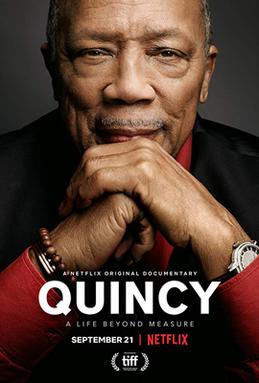Difference between revisions of "Quincy (2018)"
Skalexsong (talk | contribs) |
|||
| (2 intermediate revisions by the same user not shown) | |||
| Line 1: | Line 1: | ||
| − | '''''Quincy''''' (2018) is an American | + | '''''Quincy''''' (2018) is an American narrative film about the existence of a Black American record maker, artist and film maker Quincy Jones. The film was released by Netflix on September 21, 2018.<ref>https://en.wikipedia.org/wiki/Quincy_(film)</ref> |
[[File:Quincy (film).jpg|thumb|Quincy (film)]] | [[File:Quincy (film).jpg|thumb|Quincy (film)]] | ||
| − | |||
==Plot== | ==Plot== | ||
| − | + | A close investigation into the life Quincy Jones. A novel power in music and mainstream society for a very long time, Jones has risen above racial and social limits; his story is inseparably woven into the texture of America..<ref>https://www.imdb.com/title/tt7440432/</ref> | |
==Empowerment== | ==Empowerment== | ||
| − | One of | + | One of popular music's most talented black producer, Quincy Jones, this narrative on his life gives a look into a past universe of entertainment and the tradition of prejudice that black artists actually wrestle with today. <ref name=":0">https://www.rogerebert.com/reviews/quincy-2018</ref> |
| − | The | + | The film shows when he's singled out in front of an audience by Frank Sinatra, filling in as the Chairman's twentysomething arranger during the '60s. Follows him poring over film reels and writing down tunes as he becomes famous as a film writer, getting one of the primary black artists to do as such. It shows him in the studio with Jackson, whose accomplishment under Jones' support transformed the famous producer into an international celebrity.<ref>https://variety.com/2018/film/reviews/quincy-film-review-toronto-1202933857/</ref> |
| − | == Controversy == | + | ==Controversy== |
| − | On the documentary, Jones is also open about the | + | On the documentary, Jones is also open about the prejudice he looked out and about, similar to when he played a town which had as of late lynched a person of color before Jones and his men showed up—they depended on their white transport driver to get food, as people of color couldn't enter restaurants. Film composer Henry Mancini reviews a period as well when awhen a film maker contacted him to check whether Mancini would suggest employing Jones for a potential project. The producer was not sure whether or not black people can create such a good movie.<ref name=":0" /> |
<br /> | <br /> | ||
==Reference== | ==Reference== | ||
| − | [[Category:Black Racism in Documentary Movies]] | + | [[Category:Black-Targeted Racism in Documentary Movies]] |
| − | [[Category:Anti Black Racism in Documentary Movies]] | + | [[Category:Anti-Black Racism in Documentary Movies]] |
| + | <references /> | ||
Latest revision as of 06:21, 15 March 2021
Quincy (2018) is an American narrative film about the existence of a Black American record maker, artist and film maker Quincy Jones. The film was released by Netflix on September 21, 2018.[1]
Contents
Plot
A close investigation into the life Quincy Jones. A novel power in music and mainstream society for a very long time, Jones has risen above racial and social limits; his story is inseparably woven into the texture of America..[2]
Empowerment
One of popular music's most talented black producer, Quincy Jones, this narrative on his life gives a look into a past universe of entertainment and the tradition of prejudice that black artists actually wrestle with today. [3]
The film shows when he's singled out in front of an audience by Frank Sinatra, filling in as the Chairman's twentysomething arranger during the '60s. Follows him poring over film reels and writing down tunes as he becomes famous as a film writer, getting one of the primary black artists to do as such. It shows him in the studio with Jackson, whose accomplishment under Jones' support transformed the famous producer into an international celebrity.[4]
Controversy
On the documentary, Jones is also open about the prejudice he looked out and about, similar to when he played a town which had as of late lynched a person of color before Jones and his men showed up—they depended on their white transport driver to get food, as people of color couldn't enter restaurants. Film composer Henry Mancini reviews a period as well when awhen a film maker contacted him to check whether Mancini would suggest employing Jones for a potential project. The producer was not sure whether or not black people can create such a good movie.[3]
